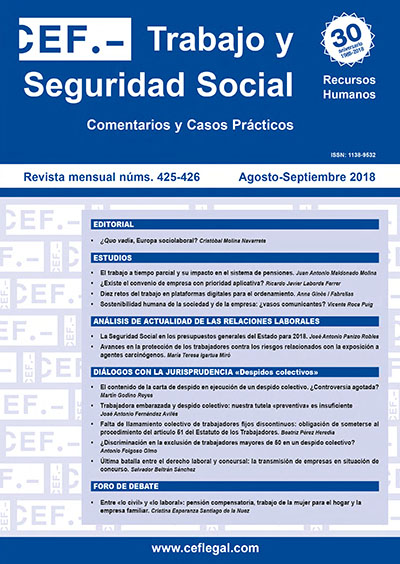Human sustainability in society and in the firm: connected vessels?
DOI:
https://doi.org/10.51302/rtss.2018.1548Keywords:
poverty, income inequality, human resource management, sustainability, firm and society, longitudinal analysisAbstract
Sustainable human resource management is a new research line that is currently growing at a rapid pace. One of the key premises of this literature is the interdependence of society and firms, with a bidirectional causal relationship between their levels of sustainability. Paradoxically, there is a lack of empirical studies to support this connection. The objective of the present study is to bridge this gap, by analyzing whether poverty and income inequality in a society influence the human resource management strategy of its firms, and vice versa. Results from a longitudinal analysis of a large sample of 1,850 Spanish industrial firms during the period 2010-2014 confirm the presence of a negative bidirectional relationship between poverty and human resource management strategy grounded on organizational commitment with employees. The study also provides evidence of a negative unidirectional causal relationship between this business strategy and income inequality. These results support the active and significant role of firms in achieving sustainable development in society, showing that the more sustainable firms’ human resource management, the more sustainable society will be.
Downloads
References
Ashkanasy, N. M., Humphrey, R. H. y Huy, Q. N. (2017). Integrating emotions and affect in theories of management. Academy of Management Review, 42, 175-189.
Athanasopoulou, A. y Selsky, J. (2015). The social context of corporate social responsibility: Enriching research with multiple perspectives and levels. Business & Society, 54, 322-364.
Bourguignon, F. (2004). The poverty-growth-inequality triangle. Agence Française de Développement, Paris.
Cobb, J. A. (2016). How firms shape income inequality: Stakeholder power, executive decision making, and the structuring of employment relationships. Academy of Management Review, 41, 324-348.
Cobb, J. A. y Stevens, F. G. (2017). These unequal states: Corporate organization and income inequality in the United States. Administrative Science Quarterly, 62, 304-340.
Combs, J., Liu, Y., Hall, A. y Ketchen, D. (2006). How much do high-performance work practices matter? A meta-analysis of their effects on organizational performance. Personnel Psychology, 59, 501-528.
Ehnert, I., Harry, W. y Zink, K. J. (2014). Sustainability and HRM. En Ehnert, I., Harry, W. y Zink, K. J. (Eds.), Sustainability and Human Resource Management. CSR, Sustainability, Ethics & Governance. Springer, Berlin Heidelberg, 3-32.
Ehnert, I., Parsa, S., Roper, I., Wagner, M. y Muller-Camen, M. (2016). Reporting on sustainability and HRM: A comparative study of sustainability reporting practices by the world’s largest companies. International Journal of Human Resource Management, 27, 88-108.
Florea, L., Cheung, Y. H. y Herndon, N. C. (2013). For all good reasons: Role of values in organizational sustainability. Journal of Business Ethics, 114, 393-408.
Gollan, P. J. (2005). High involvement management and human resource sustainability: The challenges and opportunities. Asia Pacific Journal of Human Resources, 43, 18-33.
Gouldner, A. (1960). The norm of reciprocity: A preliminary statement. American Sociological Review, 25, 161-178.
Huselid, M. A. (1995). The impact of human resource management practices on turnover, productivity, and corporate financial performance. Academy of Management Journal, 38, 635-672.
Jabbour, C. J. y Santos, F. C. (2008). The central role of human resource management in the search for sustainable organizations. International Journal of Human Resource Management, 19, 2.133-2.154.
Jiang, L. y Probst, T. M. (2017). The rich get richer and the poor get poorer: Country-and state-level income inequality moderates the job insecurity-burnout relationship. Journal of Applied Psychology, 102, 672.
Kast, F. E. y Rosenzweig, J. E. (1972). General systems theory: Applications for organization and management. Academy of Management Journal, 15, 447-465.
Kramar, R. (2014). Beyond strategic human resource management: Is sustainable human resource management the next approach? International Journal of Human Resource Management, 25, 1.069-1.089.
Leana, C. R. y Meuris, J. (2015). Living to work and working to live: Income as a driver of organizational behavior. Academy of Management Annals, 9, 55-95.
Little, T. D. (2013). Longitudinal structural equation modeling. Guilford Press, New York.
Llano, J. C. (2017). El estado de la pobreza. Seguimiento del indicador de riesgo de pobreza y exclusión social en España. EAPN (European Anti-Poverty Network), España, Madrid.
Mariappanadar, S. (2014). The model of negative externality for sustainable HRM. En Ehnert, I., Harry, W. y Zink, K. J. (Eds.), Sustainability and Human Resource Management. CSR, Sustainability, Ethics & Governance. Springer, Berlin Heidelberg, 181-203.
Miller, D. y Lee, J. (2001). The people make the process: commitment to employees, decision making, and performance. Journal of Management, 27, 163-189.
Pfeffer, J. (2010). Building sustainable organizations: The human factor. Academy of Management Perspectives, 24, 34-45.
Piacentini, M. (2014). Measuring income inequality and poverty at the regional level in OECD countries, Statistics Working Papers, 2014/03, OECD (Organisation for Economic Co-operation and development) Publishing, Paris.
Pitesa, M., Thau, S. y Pillutla, M. (2017). Workplace trust as a mechanism of employee (dis)advantage: The case of employee socioeconomic status. Research in Organizational Behavior, 37, 83-101.
Renwick, D. W., Redman, T. y Maguire, S. (2013). Green human resource management: A review and research agenda. International Journal of Management Reviews, 15, 1-14.
Roca, V. (2016). ¿Obtienen mejores resultados las empresas en una sociedad empobrecida? Evidencia empírica en España. RTSS.CEF, 403, 187-224.
Sharma, S. y Ruud, A. (2003). On the path to sustainability: Integrating social dimensions into the research and practice of environmental management. Business Strategy and the Environment, 12, 205-214.
Westerman, J., Vanka, S., Rao, M. B. y Gupta, M. (2017). Sustainable HRM: Perspectives, practices, and prognoses. Human Resource Management Review, Call for Papers.
Węziak-Białowolska, D. (2015). Poverty in the regions of the European Union - Measurement with a composite indicator. Contemporary Economics, 9, 113-154.
Wilkinson, R. G. y Pickett, K. E. (2017). The enemy between us: The psychological and social costs of inequality. European Journal of Social Psychology, 47, 11-24.
Zink, K. J. (2014). Social sustainability and quality of working life. En Ehnert, I., Harry, W. y Zink, K. J. (Eds.), Sustainability and Human Resource Management. CSR, Sustainability, Ethics & Governance. Springer, Berlin Heidelberg, 35-55.



















